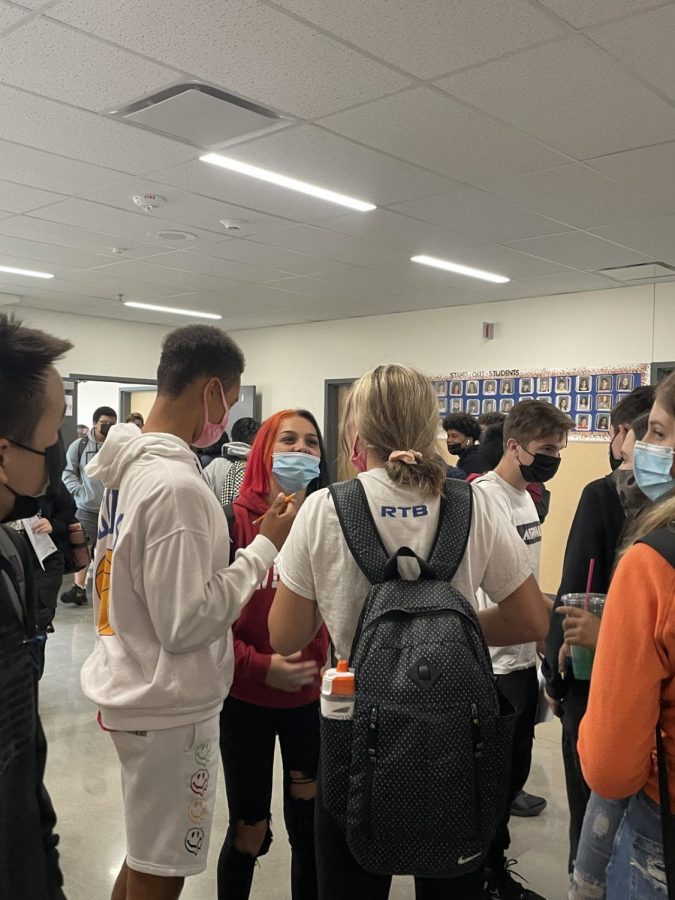Back to school: returning to school amidst an ongoing pandemic
Group of GHS students socializing in the hallways during passing time.
October 29, 2021
Mental health is an important aspect of every student’s life because it affects more than just a student’s well-being. Changes in mental health can cause problems with students’ energy level, mental ability, concentration, and more. Overall, these effects can and will affect a student’s performance in school. Attending school has always had its struggles, but many students especially had trouble with having to learn online. The goal of coming back to in-person school is to better students’ school life.
“You can really talk to the teachers more, and I think you can grasp the concept [of the class] better in person. And I just think it’s a better learning experience overall,” sophomore Luke Fahner said.
This year, students immediately noticed the benefits that only come with in-person school. Although learning through a screen was a major issue for students, it was not the only downfall of online school.
“If we’re thinking about human development, connection is really really important, to be able to learn how to get along and coexist with other people,” counselor Kathyrn Sayer said.
This skill is needed not just in school, but in most aspects of life. For students, getting to be with friends and peers is beneficial to their mental health by uplifting their mood and attitude.
“I enjoy seeing all my friends every day. That’s something I really missed with online school,” sophomore Mia Heffler said.
Students are enjoying seeing old friends daily and making new ones. Having to socialize and just being around people, in general, is especially difficult because students are coming back from over a year of online school.
“There’s been a lot of anxiety about coming back to school too. And I think, you know, students got used to being alone, even if it wasn’t necessarily the best for their mental health,” Sayer said.
Students are adjusting to returning to in-person school and sharing a school with peers. Although students want to be back in school, there are still problems and struggles that come along with it.
“It’s such a hassle to balance all 7 classes again compared to the 3 or 4 classes in online school,” senior James Atiyeh said.
Just like everything else in life, there are ups and downs, but that doesn’t mean there aren’t solutions. Certain aspects of in-person school, like having a consistent routine, has made lives easier to manage.
“Having a schedule has been the most helpful because I get up at the same time every day, go to school, then work and do homework when I come back,” Atiyeh said.
Having a daily routine has been proven to reduce stress and allow students to better manage their life. The importance of mental health connects to students’ physical health as well.
“Something that makes a big difference for me is getting up and getting some good food in me,” Fahner said.
Students who take care of their bodies will be able to focus better and have the energy to improve their mental health. If a student is struggling with mental health, they can meet with their counselor by either going to the counseling center on the first floor next to the bathrooms or by emailing them.
“It’s extra important to have a trusted adult, and to know that we’re all here in our offices and are available to see people if they need us [counselors],” Sayer said.
Counseling Center:
Legal last names begin with the letter A – B and Active ELL
Julie Conroy 503-674-5530 [email protected]
Legal last names begin with the letter C – Ha
Andrea Parra 503-674-5528 [email protected]
Legal last names begin with the letter He – M
Laura Blaser 503-674-5529 [email protected]
Legal last names begin with the letter N – R
Kathryn Sayer 503-674-5526 [email protected]
Legal last names begin with the letter S – Z
Laura Blaser 503-674-5529 [email protected]
School Social Worker (for all students)
Kate Poland 503-674-5571 [email protected]
Hotlines for Additional help
National Suicide Prevention Lifeline- United States-based suicide prevention network of over 160 crisis centers that provides 24/7 service via a toll-free hotline with the number 1-800-273-8255. It is available to anyone in a suicidal crisis or emotional distress.
800-273-8255
SAMHSA’s National Helpline- free, confidential, 24/7, 365-day-a-year treatment referral and information service (in English and Spanish) for individuals and families facing mental and/or substance use disorders.
1-800-662-HELP (4357)
